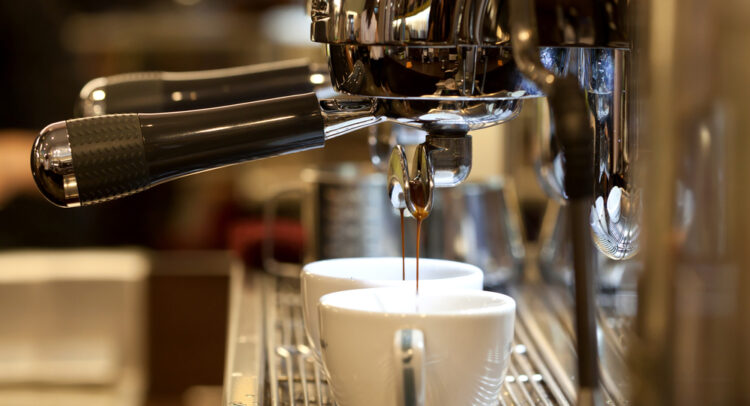The rich aroma of ground coffee beans, the pleasant music coming from the speakers, and that first sip of java help countless people to start their day off right. For many, a regular stop at the coffee shop down the street is a part of their morning ritual. Still, like any personal finance question, you should take the time to consider how much that cup of coffee actually costs you.
There are many factors that go into every financial decision, even small ones. Understanding the costs–and the inherent trade-offs–is an important part of your budgeting choices.
How Much Does a Cup of Coffee Cost?
The cost of a cup of coffee will vary by the type, size, and region where you live. Not surprisingly, specialty brews in fancy shops in more expensive zip codes will cost more than a simple cup served at a diner.
Still, at the end of 2023, the average price of a cup of coffee at a cafe hovered around $6. The price of beans has steadily risen, as have other commodities such as sugar and milk, along with wages and rents. All these expenses go into the increasing cost of your cup of coffee at your local cafe.
Of course, for these reasons, the cost of making your own coffee at home is also increasing. According to the U.S. Bureau of Labor Statistics, in January 2024 a pound of ground coffee cost an average of $6.12 in the U.S. Depending on your brewing method, a pound of coffee can make anywhere between 24-48 cups of coffee, averaging out to a range of $0.12-$0.24 a cup.
Though this does not take into account the extra costs of milk, sugar, and other additions of your choosing, it is certainly a cheaper option than purchasing your caffeine fix outside.
What are the Opportunity Costs of Buying a Cup of Coffee?
The true cost of a good or service is not just the sticker price. There is also what is known as an opportunity cost, which is defined as what you could have done with the money instead.
This is true for every decision in life, financial or otherwise. In this case, the money you are spending on coffee is not being used for other purchases or your long-term savings goals.
Conservatively speaking, if you were able to save an extra $5 a day by brewing your coffee at home, over the course of a month this would add up to an extra $150. After a year, this translates into savings of $1,800.
If you were to take this money and invest it in a Certificate of Deposit that earned 5% every year, after five years your initial investment would be worth slightly less than $2,300. Making regular contributions of $150 every month over these five years would allow this account to blossom into over $12,200. You can experiment with different investments, interest rates, and compounding intervals using TipRanks’ compound interest calculator to understand how various combinations would impact your bottom line.
What Are Your Financial Priorities?
Personal finance is by definition based on your personal priorities. Defining the right path for you relies upon numerous factors, all of which boil down to your own preferences. There is general consensus around certain line items in your budget, such as making your mortgage or rent payments, food costs, and creating an emergency savings fund.
The purpose of budgeting is to plan our your finances. There are numerous budgeting strategies, but all of them are geared towards helping you find the right balance between your needs, wants, and future savings goals.
Beyond the basics, however, there is a decent amount of leeway. For instance, what could be important for some (saving up for a down payment on a house) is less crucial for others.
In that vein, purchasing a coffee at your local cafe could be an important part of your social routine, one that helps you to feel confident and happy. Exchanging a pleasant word with other regulars can put you into a positive frame of mind, which could pay dividends for you throughout the rest of the day.
On the other hand, you may decide that you would be better off saving money by making your own coffee (or even switching to water), and investing these proceeds into the market.
Conclusion: Making Well-Informed Decisions
Life is full of trade-offs. Some are big, but most are small, everyday decisions. Purchasing a cup of coffee once or twice a month will not have a meaningful impact on your bottom line, of course. Still, it is a choice.
The smooth, rich flavors whipped up by your favorite barista could be well worth the extra cost for you. Or, you could elect to invest in making delicious coffee at home, saving money along the way.
The choice is yours. Just make sure that you are making well-informed decisions, taking into account all of the financial repercussions.
Learn money management, and use data-driven stock insights with TipRanks.









